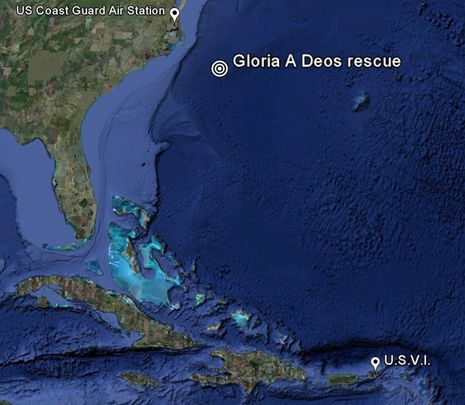Gloria A Dios, & to ACR, SARSAT, USCG, USN, etc.
One of the great technological and human triumphs of our time has to be the offshore rescue system. Some details remain unclear -- like what sort of sailboat Gloria A Dios was, and what route owner/operator Dennis Clements attempted to single hand from Virginia to the Virgin Islands -- but we do know this: 90 minutes after the Elizabeth City, N.C., USCG got the distress signal from his ACR Satellite 2 EPIRB at 5 pm last Saturday night, an HC-130J Hercules aircraft was standing by over the boat 250 miles off Cape Hatteras in nasty full gale conditions. It was that crew who thermal imaged Glory To God (a sobbering film you can find at the bottom of this USCG page), and who dropped two life rafts when an extra big wave dismasted and then holed her...
Getting a helicopter out there was a trickier proposition, so the Coast Guard called on the aircraft carrier USS Dwight D.
Eisenhower which had departed Norfolk, VA, earlier that day. The USN then dispatched a SAR team in a Sea Hawk helo, who flew 100 miles in winds hitting 45 knots with snow and sleet. By the time they joined the Hercules on scene, Clements had been in the water for about an hour, but had found one of the rafts. Rescue swimmer Kyle Need plucked him out of the ocean in just minutes! The mission copilot, Cmdr. Byron Ogden, is quoted on the USN site thusly: "This is honestly one of the most varsity things we could do as far as
SAR goes. I didn't hear one bit of panic in anybody's
voice; the whole crew was very calm, cool and collected."
Clements checked out fine on the carrier and was flown back to the mainland on a USCG helicopter, where he was filmed describing his experience. Now he's apparently back in Missouri, and, frankly, I'm beginning to wonder if he's already forgotten how many carefully built government institutions and their skilled personnel saved his butt. This article in his local paper may be largely the fault of its author, but Clements seems to be giving a lot of credit to God, and little to the people who actually risked their lives for his. Am I being crabby, or do you agree that this rescue is less a "miracle" than the result of amazingly well developed systems?


 Share
Share
This guy...and that "Jesus is my crewmate" article...ticked me off a bit. I get very little sense that the sailor in question was prepared for this voyage, or needed to make it in the face of known bad weather, or needed to go offshore.
I was on a delivery crew on a Bristol 45.5 in the first half of November from Mobjack, VA to the USVIs (so almost the same route), and even though I've seen plenty of rough weather on the Great Lakes, and even though we were a crew of four on an 18 tonne boat, this was not a trivial delivery. Between a very deep trough and a revived Hurricane Ida, conditions were often rough until the proper tropics and we played chicken with worse weather for the first nine days. Certainly those who did the Caribbean 1500 got worse than us...we kept on keeping on thanks to the big air, but we could've had more or worse or longer squalls than we did.
The idea of doing this solo...in a 35 footer...in January...during a predicted gale... strikes me as foolhardy and dangerous.
That's why I choose to ignore the story of the sailor himself and focus, rightly, I think, on the excellent SAR effort. I do have to wonder, however, if the potential for pulling people alive from the water from offshore distances isn't sending the wrong message to underprepared sailors that "the Coast Guard will save my ass no matter what".
This will not advance the offshore cruising lifestyle any more than having airbags means you can leave the seatbelt off and drive drunk.